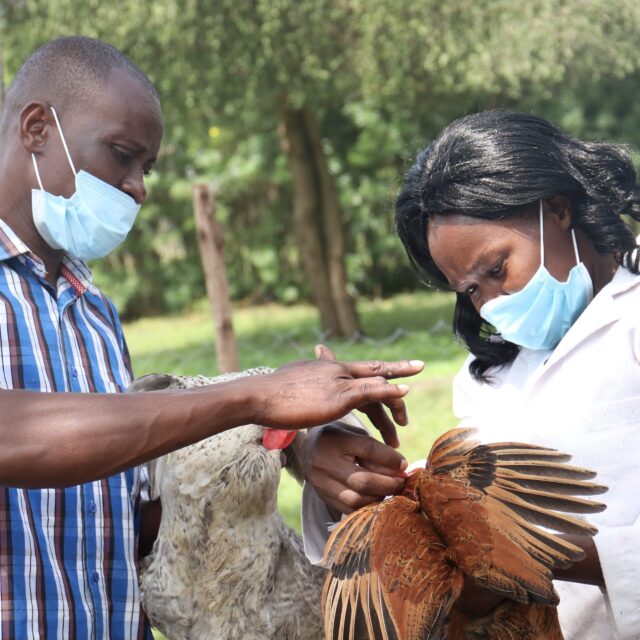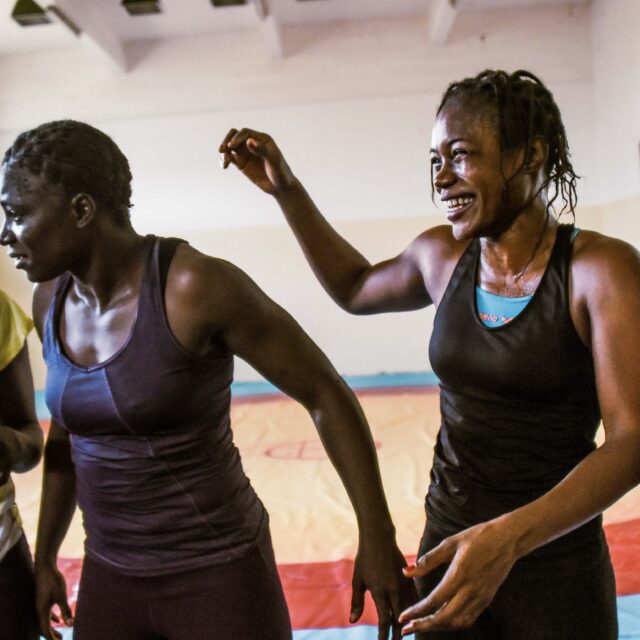After surviving 17 years of domestic abuse, Lilian Ocholla separated from her husband a year ago. She has overcome many challenges and, with the help and support of her family, is focused on improving her well-being and building a better future for herself and her children.
Today, the 39-year-old mother and farmer who is part of Hatching Hope in Kenya is challenging gender-based violence by setting up what is fast becoming a successful poultry business. “My mom used to organize some small businesses for me while I came back home. [Her husband] would then come and destroy all of them. He would just spoil everything, and then I would go back to him again. This time I told myself that I have to do it. This is why I started poultry farming,” she said.
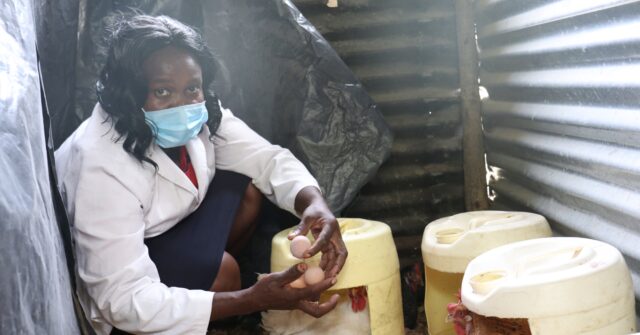
Through a partnership between Cargill and Heifer International, the project Hatching Hope in Kenya works to empower smallholder farmers as integral players in the poultry value chain while at the same time, alleviating malnutrition through poultry promotion and consumption.
Hatching a new plan
Lilian’s mom, a strong force in her life, died in 2020, but Lilian’s father continues to support her. After hearing an advert on a local radio station inviting people to attend a training in Kisumu town, she decided to start a poultry business of her own – and in the months since, she hasn’t looked back.
“I heard an advert on Lake Victoria FM, and I liked what they were saying about poultry farming,” Lilian said. “I went to Kisumu and talked to the staff from Chicken Basket, saw their chicken, and admired the work they were doing.”
In addition to learning more information from Chicken Basket, a large-scale buyer that has partnered with Hatching Hope Kenya, she met Christopher Adhola, a Community Agrovet Entrepreneur (CAVE) from Bora Cooperative, one of the producer’s organizations that’s part of Hatching Hope.
“He shared with me a lot of technical advice on poultry farming and introduced me to a training he was conducting at Uwimbi with Hatching Hope and the Kenya Society for Agricultural Professionals,” Lilian said. “I went there weekly for one and a half months, and I got a lot of information such as how to handle poultry diseases, vaccination, marketing, and structure construction.”
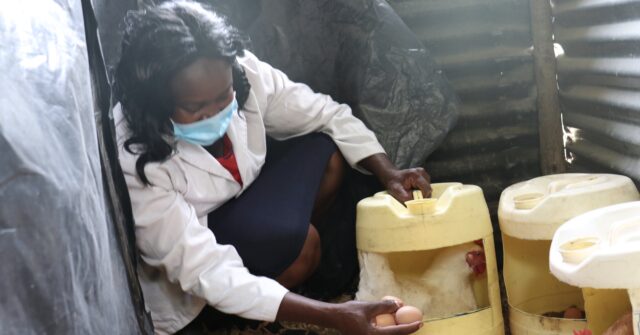
Three months later, Lilian has 78 birds and is already making plans to take her business to the next level.
Hatching Hope is working to improve the livelihoods of producers like Lilian and increase their production skills and business knowledge by sharing Cargill’s technical know-how and markets access expertise.
Making an investment
Securing starting capital is one of the biggest obstacles facing many small-scale poultry farmers like Lilian, and the situation has been made worse by the global pandemic. Lilian was fortunate to have her parents support her with start-up capital.
“My mother left us some money, so I told my dad that I wanted to use the funds to start this poultry business, and he liked it. It’s as if we are doing it jointly. I want him to be part of it anyway. He has been quite encouraging and supportive in everything. So, we took some money and invested it in this business.”
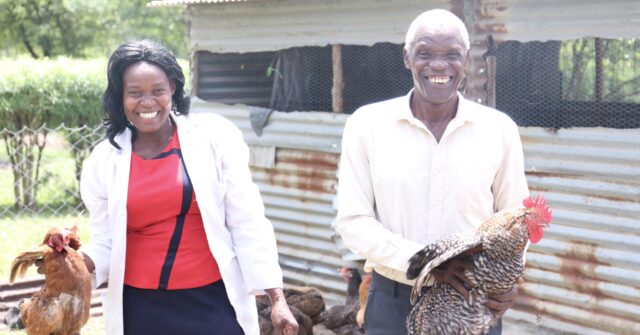
Her father, Benson Ochola Otieno, says that the total money invested was $965, including $368 to construct the poultry house and other structures, $359 to purchase 100 two-month-old chicks that each cost $36, and $239 went to feed supply.
One of Lilian’s biggest worries, however, was figuring out how to market her birds and make a profit, as she focused on branching into the commercial poultry business.
Tapping into a new market
“I was concerned about marketing because sometimes you can have the chicken, but you don’t have the market,” she explained. “Chris told me about Bora Cooperative, who are marketing for their farmers, and this got me more interested because I easily get [a] market for my produce.”
Since Lilian joined Bora Cooperative, a farmer-owned agribusiness supported by Hatching Hope Kenya, she has improved her business and found new customers.
“Bora has helped me a lot. In fact, recently, when I wanted to sell the cockerels, I just took pictures of them, and I posted on our WhatsApp group, and within two days I had sold 15, each at $7.”
Lilian and her father have already formed a Poultry Interest Group in her village to increase farmers’ awareness about commercial poultry farming.
“My dad and I just went around talking to the villagers urging them to come together and form a group … because I want their livelihoods to change. People are not serious about poultry farming, but if I can get 20 serious people, I can help them change, and we can work together.”
She is happy that the group is growing and currently has 11 members. They receive training from community facilitators who are connected to Bora Cooperative.
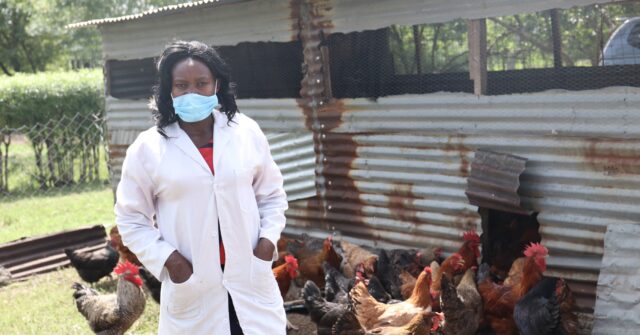
“Even if I go to the market and talk to two people, you’ll get at least one who responds positively. Recently I went to church to deliver a crate of eggs. In addition, I taught a few people about synchronization for like 10 to 15 minutes. ”Digital tools such as WhatsApp have been useful in her mobilization activities and members of Bora Cooperative are also embracing these tools.
Christopher affirms the importance of this synchronization.
“What she just said about synchronization is very important because if she can promote that, within a short amount of time, these farmers will be able to increase their flock sizes. With synchronization, they can get fertile eggs from her,” he said. “I am also encouraging them to synchronize two or three birds such that when they are given eggs to lay on, they can hatch at the same time so that if you give them each 10 eggs, with 80-90% hatchability, one will be able to get a good number of chicks at once.”
Facing challenges
In Lillian’s community, many poultry farmers face challenges starting up their businesses. Hatching Hope offers a new way of engaging in communities and connecting farmers to the business expertise of Cargill’s teams around the world, with a focus on farmer prosperity and safe, responsible, and sustainable nutrition.
“The most common problem is lack of proper poultry structures. Some people are very poor, and they do not have structures. I am advising them to use locally available materials such as trees,” she said.
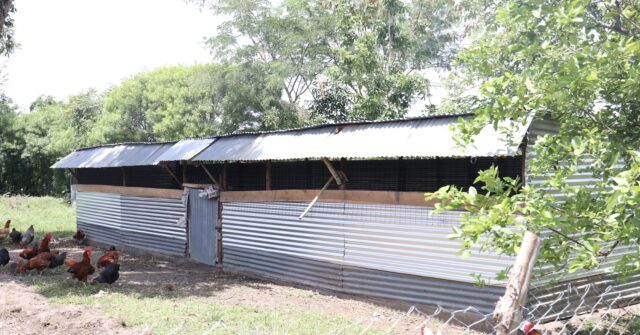
Despite this challenge and others, Lilian is determined to grow her poultry business, setting a target of owning 1,000 birds by the end of 2021. Lilian hopes that poultry farming will not only address financial needs for her and her community, but also increase food security, which has especially deteriorated due to the impact of the COVID-19 pandemic.
“Myself, I am just OK, but you find many in this community can only afford one gorogoro (2kg tin of maize) to feed their families, which is not always enough,” Lilian says.
With more people embracing poultry rearing, she hopes more people will opt to consume meat and eggs within her community, and ultimately, fight food insecurity.
